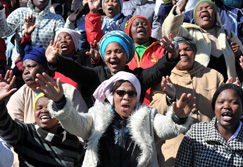Fighting gender violence 'everyone's duty'
26 November 2013
It is the duty of all South Africans to play their part in the fight against the abuse of
women and children, Brand South Africa said as this year's 16 Days of Activism for No
Violence against Women and Children campaign got under way on Monday.
"It is a basic human right to have a sense of safety and security," Brand South Africa
marketing and communications director Wendy Tlou said in a statement. "It is our
duty as citizens of our country, young or old, men or women to play our part to build
a non-violent and secure nation and make this a 365 day campaign in our country.
"We call on you to speak out and encourage victims to seek help," Tlou said. "We urge
all men to support women and children, and play their part through active opposition
of abuse.
"As South Africa prepares to mark 20 years of democracy, there are many
achievements and milestones that we can celebrate as a nation. We must begin to
count as a
success the way in which we treat women and children."
Abuse 'threatens our hard-won freedom'
Women, Children and People with Disabilities Minister Lulu Xingwana echoed these
sentiments during the launch of the 16 Days campaign in Mafikeng, North West
province on Sunday.
Xingwana said abuse threatened to erode many of the hard-earned gains of South
Africa's liberation struggle by condemning women and children to a life of fear and
preventing them from being productive members of society.
"We believe that the unacceptably high levels of gender-based violence require the
collective efforts of all South Africans," Xingwana said. "We remain convinced that
empowering women will help us win the war against poverty, inequality,
unemployment and abuse."
The 16 days of Activism for No Violence Against Women and Children is a worldwide
campaign that raises awareness of the negative impact of violence on women and
children and
encourages people to act against abuse.
The campaign runs worldwide from 25 November (International Day for the
Elimination of Violence against Women) to 10 December (International Human Rights
Day), with the government, business, civil society organisations, faith-based
organisations and the media all participating in the awareness drive.
Measures to combat gender violence
South Africa is still home to high levels of violence against its women and children,
despite a world-renowned Constitution and a legislative overhaul that safeguards
women's and children's rights.
In the last year, the government has established a National Council against Gender
Based Violence as well as an inter-ministerial committee to look into the root causes
of violence against women and children in the country.
The reinstatement of sexual offences courts across the country over the next three
years will also boost South Africa's efforts to combat
gender-based violence. The
courts will feature specially trained officials, procedures and equipment to reduce the
chance of secondary trauma for victims.
And earlier this month, Xingwana said the government would be working to implement
the National Action Plan for Children. The plan, approved by the Cabinet in May, is a
comprehensive guide for all government departments and agencies for realising
children's rights.
It takes into account the Constitution‚ international and regional treaties‚ South African
legislation‚ the UN Millennium Development Goals and the National Development Plan.
"It is crucial that we invest more time and effort and exercise more vigilance to
ensure that all our children are safe and protected," Xingwana said. "Twenty years
into our democracy, our democratic government has done a lot for our children, but
we acknowledge that a lot more still needs to be done.
"We must continue to build a South Africa where our
children feel safe and secure,
and that responsibility falls on us as government and also on families, parents and
communities. Our children need support from all of us."
SAnews.gov.za
 Working for the empowerment of South African women (Photo: GCIS)
Working for the empowerment of South African women (Photo: GCIS)


